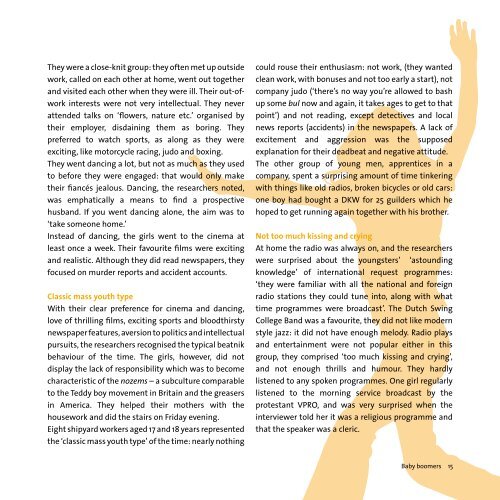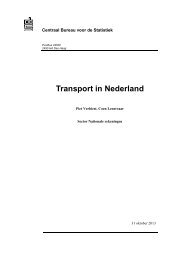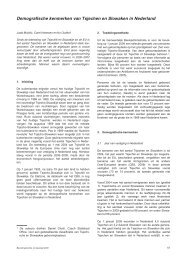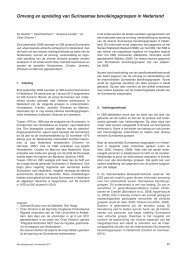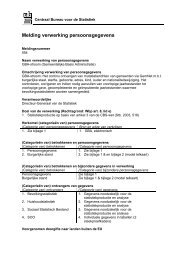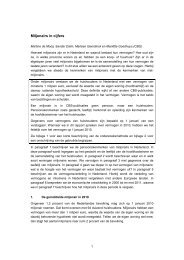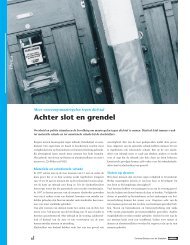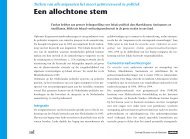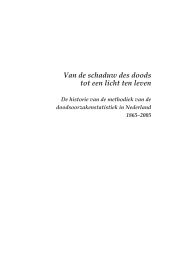Babyboomers in the Netherlands: What the statistics say - Cbs
Babyboomers in the Netherlands: What the statistics say - Cbs
Babyboomers in the Netherlands: What the statistics say - Cbs
You also want an ePaper? Increase the reach of your titles
YUMPU automatically turns print PDFs into web optimized ePapers that Google loves.
They were a close-knit group: <strong>the</strong>y often met up outside<br />
work, called on each o<strong>the</strong>r at home, went out toge<strong>the</strong>r<br />
and visited each o<strong>the</strong>r when <strong>the</strong>y were ill. Their out-ofwork<br />
<strong>in</strong>terests were not very <strong>in</strong>tellectual. They never<br />
attended talks on ‘flowers, nature etc.’ organised by<br />
<strong>the</strong>ir employer, disda<strong>in</strong><strong>in</strong>g <strong>the</strong>m as bor<strong>in</strong>g. They<br />
preferred to watch sports, as along as <strong>the</strong>y were<br />
excit<strong>in</strong>g, like motorcycle rac<strong>in</strong>g, judo and box<strong>in</strong>g.<br />
They went danc<strong>in</strong>g a lot, but not as much as <strong>the</strong>y used<br />
to before <strong>the</strong>y were engaged: that would only make<br />
<strong>the</strong>ir fiancés jealous. Danc<strong>in</strong>g, <strong>the</strong> researchers noted,<br />
was emphatically a means to f<strong>in</strong>d a prospective<br />
husband. If you went danc<strong>in</strong>g alone, <strong>the</strong> aim was to<br />
‘take someone home.’<br />
Instead of danc<strong>in</strong>g, <strong>the</strong> girls went to <strong>the</strong> c<strong>in</strong>ema at<br />
least once a week. Their favourite films were excit<strong>in</strong>g<br />
and realistic. Although <strong>the</strong>y did read newspapers, <strong>the</strong>y<br />
focused on murder reports and accident accounts.<br />
Classic mass youth type<br />
With <strong>the</strong>ir clear preference for c<strong>in</strong>ema and danc<strong>in</strong>g,<br />
love of thrill<strong>in</strong>g films, excit<strong>in</strong>g sports and bloodthirsty<br />
newspaper features, aversion to politics and <strong>in</strong>tellectual<br />
pursuits, <strong>the</strong> researchers recognised <strong>the</strong> typical beatnik<br />
behaviour of <strong>the</strong> time. The girls, however, did not<br />
display <strong>the</strong> lack of responsibility which was to become<br />
characteristic of <strong>the</strong> nozems – a subculture comparable<br />
to <strong>the</strong> Teddy boy movement <strong>in</strong> Brita<strong>in</strong> and <strong>the</strong> greasers<br />
<strong>in</strong> America. They helped <strong>the</strong>ir mo<strong>the</strong>rs with <strong>the</strong><br />
housework and did <strong>the</strong> stairs on Friday even<strong>in</strong>g.<br />
Eight shipyard workers aged 17 and 18 years represented<br />
<strong>the</strong> ‘classic mass youth type’ of <strong>the</strong> time: nearly noth<strong>in</strong>g<br />
could rouse <strong>the</strong>ir enthusiasm: not work, (<strong>the</strong>y wanted<br />
clean work, with bonuses and not too early a start), not<br />
company judo (‘<strong>the</strong>re’s no way you’re allowed to bash<br />
up some bul now and aga<strong>in</strong>, it takes ages to get to that<br />
po<strong>in</strong>t’) and not read<strong>in</strong>g, except detectives and local<br />
news reports (accidents) <strong>in</strong> <strong>the</strong> newspapers. A lack of<br />
excitement and aggression was <strong>the</strong> supposed<br />
explanation for <strong>the</strong>ir deadbeat and negative attitude.<br />
The o<strong>the</strong>r group of young men, apprentices <strong>in</strong> a<br />
company, spent a surpris<strong>in</strong>g amount of time t<strong>in</strong>ker<strong>in</strong>g<br />
with th<strong>in</strong>gs like old radios, broken bicycles or old cars:<br />
one boy had bought a DKW for 25 guilders which he<br />
hoped to get runn<strong>in</strong>g aga<strong>in</strong> toge<strong>the</strong>r with his bro<strong>the</strong>r.<br />
Not too much kiss<strong>in</strong>g and cry<strong>in</strong>g<br />
At home <strong>the</strong> radio was always on, and <strong>the</strong> researchers<br />
were surprised about <strong>the</strong> youngsters’ ‘astound<strong>in</strong>g<br />
knowledge’ of <strong>in</strong>ternational request programmes:<br />
‘<strong>the</strong>y were familiar with all <strong>the</strong> national and foreign<br />
radio stations <strong>the</strong>y could tune <strong>in</strong>to, along with what<br />
time programmes were broadcast’. The Dutch Sw<strong>in</strong>g<br />
College Band was a favourite, <strong>the</strong>y did not like modern<br />
style jazz: it did not have enough melody. Radio plays<br />
and enterta<strong>in</strong>ment were not popular ei<strong>the</strong>r <strong>in</strong> this<br />
group, <strong>the</strong>y comprised ‘too much kiss<strong>in</strong>g and cry<strong>in</strong>g’,<br />
and not enough thrills and humour. They hardly<br />
listened to any spoken programmes. One girl regularly<br />
listened to <strong>the</strong> morn<strong>in</strong>g service broadcast by <strong>the</strong><br />
protestant VPRO, and was very surprised when <strong>the</strong><br />
<strong>in</strong>terviewer told her it was a religious programme and<br />
that <strong>the</strong> speaker was a cleric.<br />
Baby boomers 15


